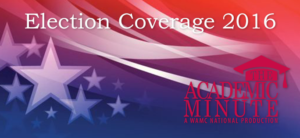 If you want someone to switch political sides, try their perspective.
If you want someone to switch political sides, try their perspective.
Matthew Feinberg, Assistant Professor of Organizational Behaviour at the University of Toronto’s Rotman School of Management, explores why people tend to stick to their own side in a heated debate.
Matthew Feinberg is an Assistant Professor of Organizational Behaviour at Rotman. He earned his PhD in Social Psychology from the University of California, Berkeley. His research explores the underlying psychological processes that lead individuals to join together to form cohesive groups and societies, with a particular focus on morality and political attitudes. Matthew’s research has been published in journals such as Psychological Science, Journal of Personality and Social Psychology, Emotion, and Political Psychology. His work has been covered by various media outlets including The Washington Post, New York Times, Reuters, Fox News, Scientific American, Al Jazeera, CBS News, USA Today, WebMD, National Geographic, Huffington Post, and San Francisco Chron.
 Persuading Political Opponents
Persuading Political Opponents
Why is it so hard to persuade someone from the other side of the political spectrum to support your position? “What’s wrong with them?” you may ask. The question you should be asking is “What’s wrong with my argument that makes it so unpersuasive?”
Research shows that liberals more strongly endorse values like compassion, fairness, and equality, whereas conservatives more strongly endorse values like group loyalty, tradition, and sanctity. If you make arguments appealing to your own values, chances are you’ll be less effective. But, if you take your audience’s moral perspective your arguments can be more persuasive.
Of course, this is no easy task. When asked to compose arguments aimed at persuading the political opposition, we found participants base their arguments on their own values, not those of the audience they’re aiming to persuade.
But, we find, there is good reason to reframe your arguments so they appeal to your audience’s values. In one study, we presented conservative participants with arguments in favor of same-sex marriage. One group read arguments grounded in fairness and equality concerns, emphasizing that everyone should have an equal right. A second group of conservatives read arguments grounded in group loyalty concerns, highlighting how gay Americans are proud, patriotic Americans who contribute to our nation. Conservatives in this second group reported more endorsement of same-sex marriage. In a separate study, we presented arguments in favor of military spending to liberals. Some read arguments grounded in notions of loyalty and patriotism, highlighting how the military makes America great. Others read arguments grounded in fairness concerns, emphasizing how the military levels the playing field for America’s poor and minorities. This fairness argument persuaded the liberals significantly more.
So, the next time you’re trying to persuade someone from the other side of the political spectrum, try understanding their moral perspective. Not only will this show that you respect them and where they’re coming from, but you might just end up persuading them.

Comments
One response to “Matthew Feinberg, University of Toronto – Persuading Political Opponents”
I have written extensively about this from an activists point of view
https://www.confessionsofanon-violentrevolutionary.co.uk/
Confessions Of a Non-violent Revolutionary: Bean Stew, Blisters, Blockades and Benders.
The True Story of a Peace Activist in Thatcher’s Britain by Chris Savory. Clairview Books 2020
Britain in the 1980s – strikes, the dole, IRA bombings, CND demos, poll tax riots, vegetarian food, radical feminism and an international build-up of weapons guaranteeing ‘mutually-assured destruction’.
Rejecting the privileges that life offers him, Chris Savory seeks to redress wider injustices in society by rejecting future wealth, power and status to follow his ideals. He throws himself into political struggle – living in poverty, sleeping in tents and on floors, braving the mud and cold, surviving on bean stews and wholemeal bread – to the general disapproval of respectable society. His aim? To bring about a non-violent revolution, disarmament and an eco-feminist-socialist utopia!
Oxford University in 1980 opens up a world of opportunity, but the threat of imminent nuclear war pushes Chris to make life-changing decisions. Alienated by the casual superiority of his peers, he abandons essay-writing and sherry with the Dean to embark on a constant round of organising and protesting – peace-camps, marches, illegal direct actions, communes and anarchist street theatre. The triumph of Thatcherism and the defeat of progressive politics leaves him feeling despair, anger and isolation. But having given everything to fight the system, how can he re-enter mainstream society?
At the heart of this memoir is a deeply honest and heartfelt human story, spiced with humour and colourful details of the 1980s’ counterculture. In an age of climate crisis and Extinction Rebellion, Confessions Of A Non-Violent Revolutionary is a thought-provoking and engaging record of a previous wave of mass civil disobedience and an opportunity to learn lessons from the recent history of grassroots political struggle.
‘… Insights into how individual action can play a role in avoiding Armageddon.’ – Billy Bragg
‘Terrific – thoroughly engaging and a real page-turner … wonderfully evocative, thought-provoking and a fascinating window into a world which until recently seemed almost old-fashioned, but now has a particular resonance in our re-politicized age.’ – Jason Webster, author of Violencia, Duende, The Anarchist Detective.
‘Intriguing – a fascinating and racy record of a life which will find many resonances in its readers. Particularly striking is its sense of journey through idealism, disillusion, and the yet remaining conviction that the struggle is not lost.’ – Harvey Gillman, author of A Light that is Shining, A Minority of One.